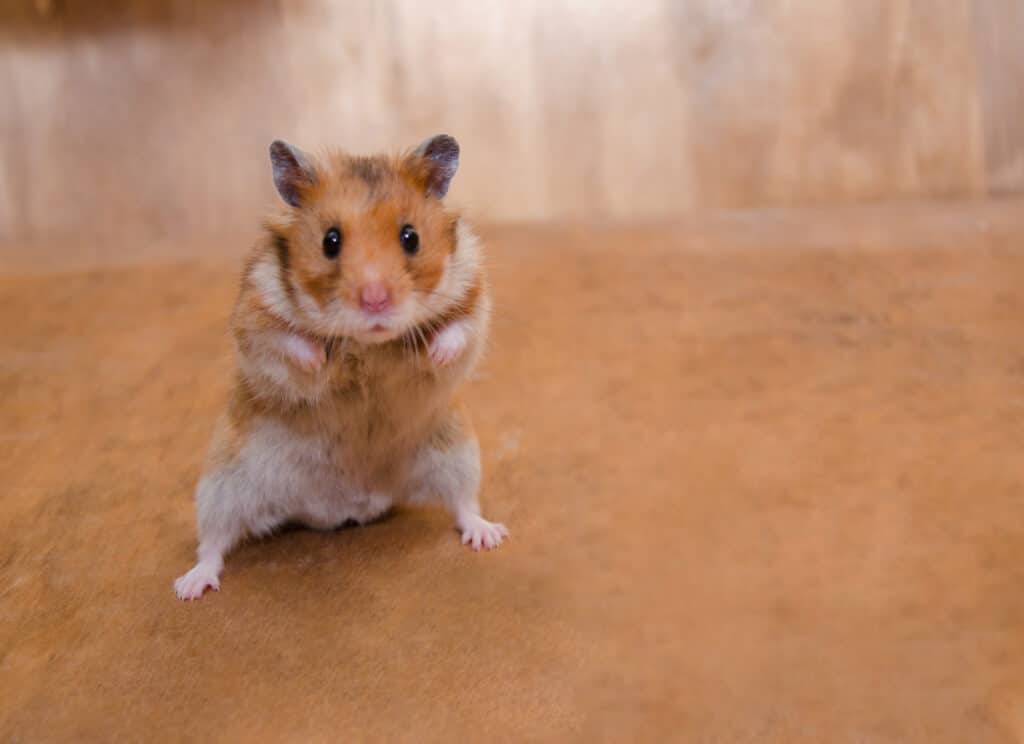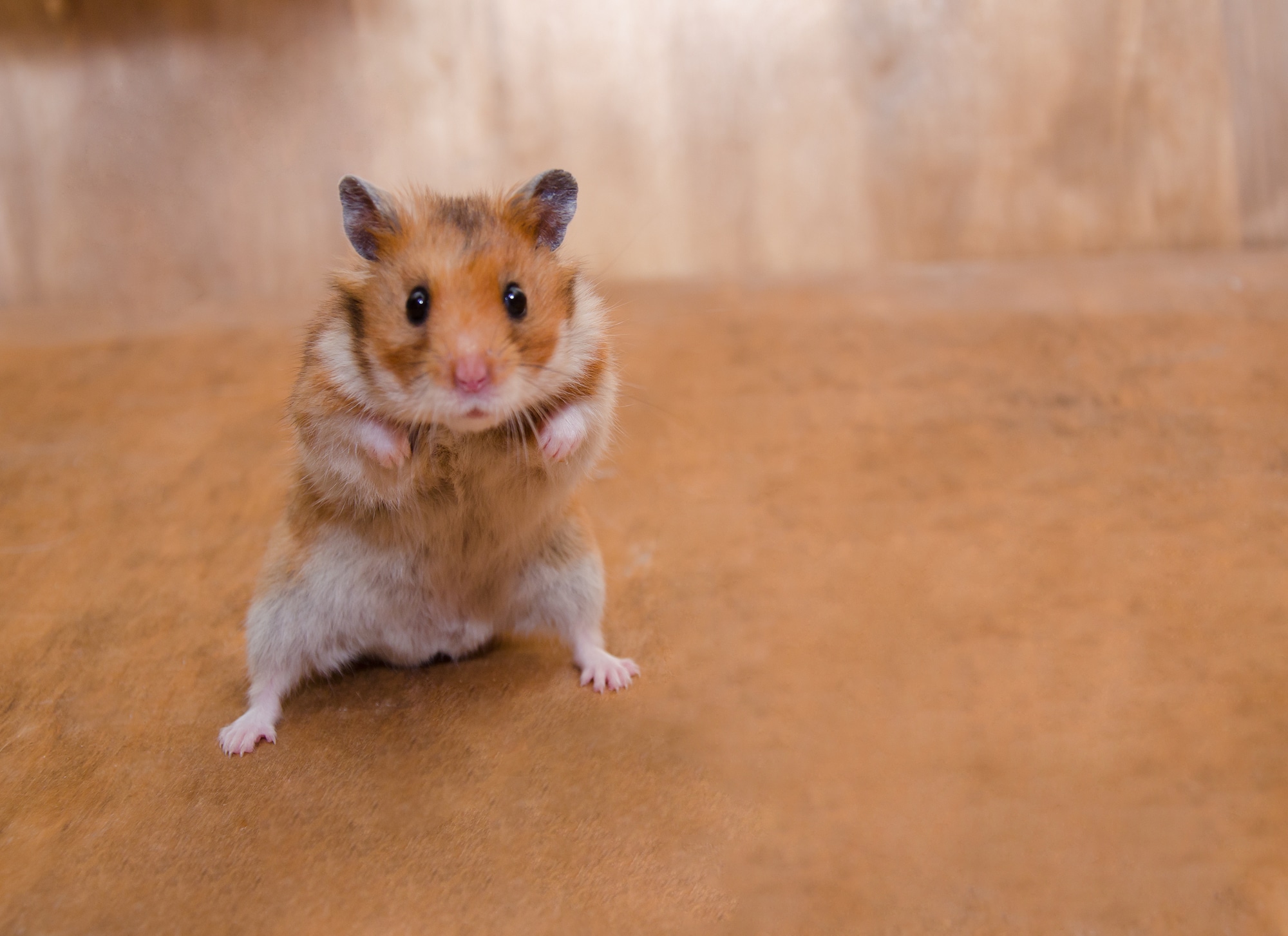It may be rare, but at times, pets do bite their owners. I have known people who got bitten by their own dogs. But what about hamsters? Do hamsters bite? Are hamster bites poisonous? Why is your hamster biting you, and what can you do to stop it? Read this blog post and find out.
- Do hamsters bite?
- Why does your hamster bite you? What can you do to stop your hamster from biting you?
- 1. Your hamster is scared
- 2. Your hamster is bored/depressed
- 3. Your hamster is new
- 4. Your hamster cannot be tamed
- 5. You hurt your hamster
- 6. Your hamster is sick
- 7. Your hamster is just not in the mood
- 8. You wake your hamster up from sleep
- 9. Your hamster thinks that you are food
- 10. Your hamster is pregnant or has given birth
- 11. Your hamster is picked up by unfamiliar people
- Are hamster bites dangerous?
- Can hamster bites kill you?
- What to do if your hamster bit you?
Do hamsters bite?
While it is pretty uncommon, pets do bite their owners.
A few years ago, a 22-year-old woman died after being attacked by the two dogs she had raised since they were puppies (Source: BBC). So, if dogs, hailed as man’s most loyal companions, can act that way, it wouldn’t be surprising for a hamster to bite you.
Of course, a hamster’s bite is not as immediately life-threatening as a dog’s bite. Yet, it can be painful.
My own experience
On 20.06.2023, our hamster bit me. Our hamster is completely nocturnal. He wakes up between 20:00 and 21:00. I give him treats (fruits, vegetables, and seeds), and he eats them from my hand. Then I keep some hamster food mix in his food bowl, clean the water bowls and replace the water in them.
Around 21:30, he starts running in his wheel.
So, long story short, I spend only about 15 – 30 minutes with my hamster. On 19.06.2023, my wife complained that I was spending very less time with our hamster and that if we wanted to tame him, we should spend more time with him. So, I woke up early (around 04:30) the next day. Our hamster was running in his wheel. I stuck my hand inside the cage and moved it towards him, thinking he would recognize my hand and come to me.
Instead, he suddenly jumped from his wheel quickly and bit me hard. I think he mistook me for food. Either that, or he was startled when I switched on the lights, was already on high alert for an enemy, and thought that I was an enemy and bit me. Regardless of the reason, I immediately pulled my hand outside by reflex. But it was too late. I was already bleeding.
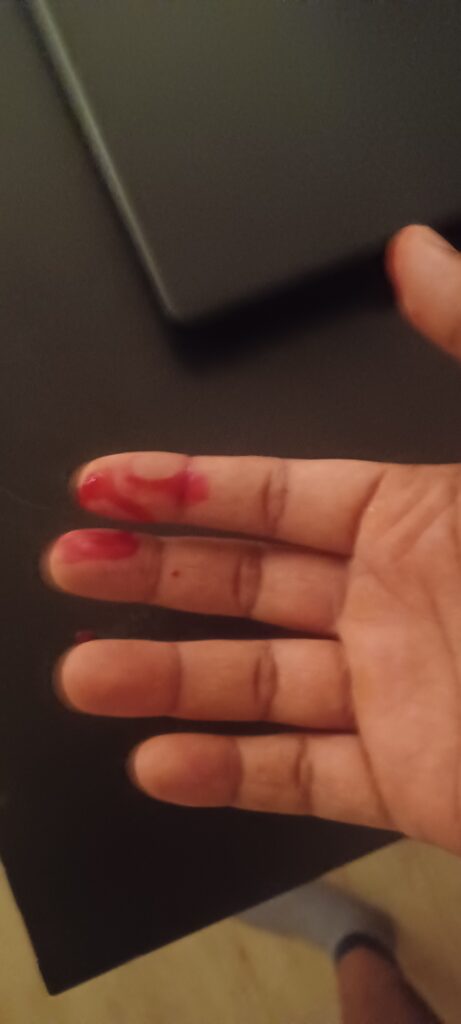
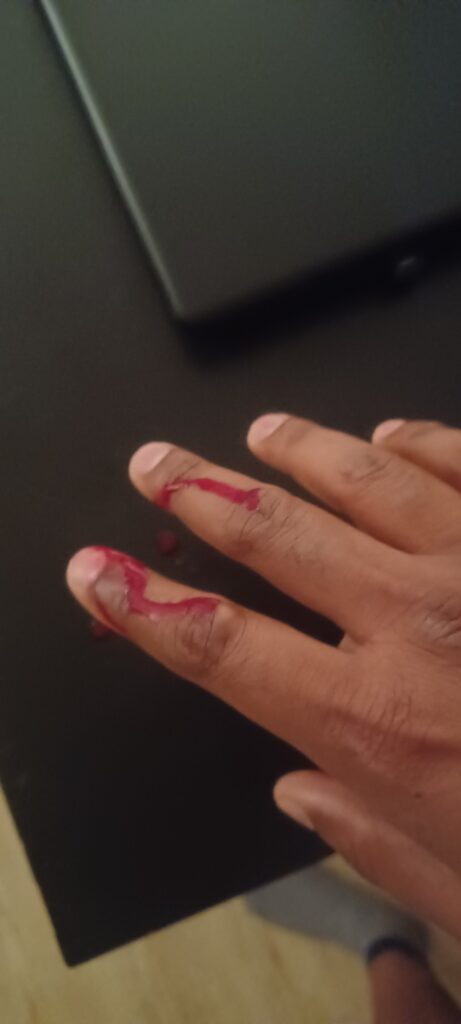

Since I did not have an antiseptic with me, I went to the doctor, who cleaned the wound with an antiseptic and sent me home. The bleeding stopped in a few minutes, but the pain remained for two weeks.
Since then, I have been cautious about putting my hand inside the aquarium early in the morning. Moreover, I built a secondary cage without a top, which helps me engage with my hamster much more easily when compared to the aquarium (In the picture below, you can see the aquarium, which has only two openings, and the secondary cage, which is just a plastic box without a cover and how they are connected by a plastic pipe which helps our hamster move from one cage to another). Since then, two months have passed, and our hamster hasn’t bitten me again.
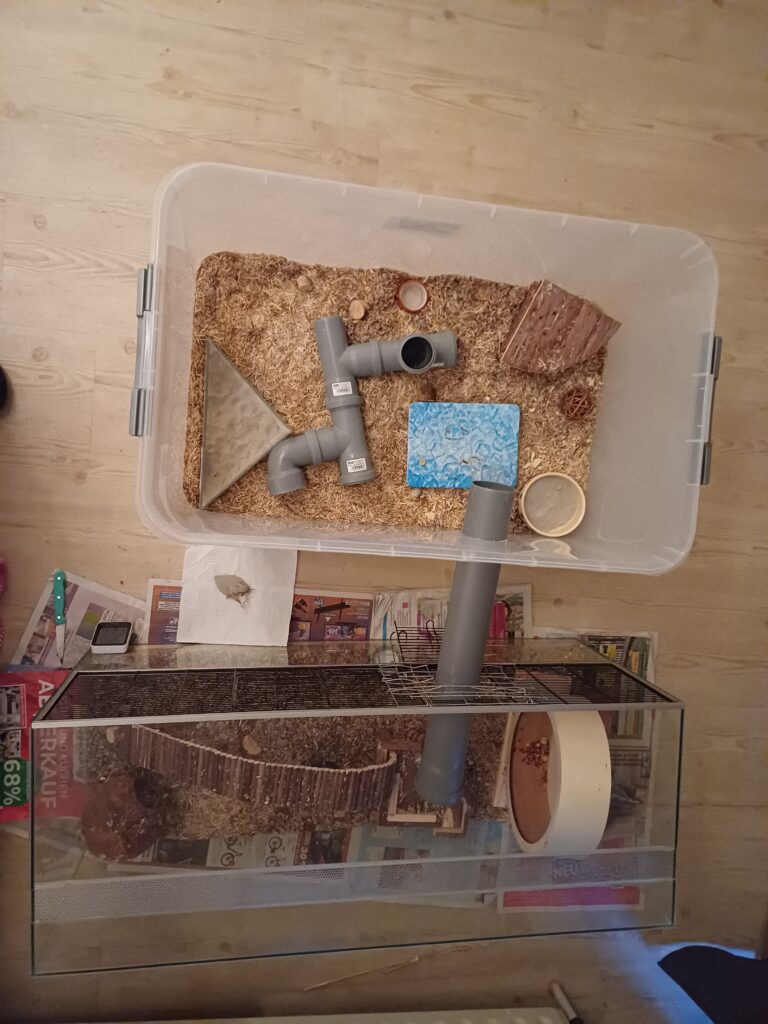
But if it can happen to me, it can happen to you, as well. So, as a hamster owner, you should understand why your hamster bites you and take the necessary steps to stop this behavior.
So why do hamsters bite their owners?
Why does your hamster bite you? What can you do to stop your hamster from biting you?
Your hamster may bite you due to any of the following reasons:
1. Your hamster is scared
Hamsters are tiny prey animals. They can get scared and stressed quickly. Moreover, they have excellent senses of smell and hearing and an amazing ability to detect movements. So, they can hear sounds we cannot hear, and smell scents too faint for our noses to catch. Therefore, any loud sounds, sudden movements, and strong scents can stress your hamster out.
Noises from devices like lawnmowers, power drills, and vacuum cleaners can scare your hamster.
If you move your hamster cage all of a sudden, hit it accidentally, or jump near the cage, your hamster can get scared quickly.
Pungent smells, like rotten food in the cage, soiled bedding, etc., can also disturb your hamster and stress him out.
Moreover, a hamster cage should have enough hamster hideouts for a hamster to hide and feel safe if he feels threatened. If there aren’t sufficient places to hide, your hamster could get scared and stressed.
If you attempt to pick your hamster up when he is scared, he may get defensive and bite you.
What should you do?
- Make sure that the hamster cage is not located in a chaotic place. Keep it in a room that is not loud and where people don’t frequently visit.
- If you have bigger pets, like a cat or a dog, make sure that your hamster’s cage is out of their reach. It is best to keep your hamster cage in a room that is not accessible to bigger pets.
- Walk slowly when you are near the cage.
- Remove uneaten food items and soiled bedding from the cage every day without fail.
2. Your hamster is bored/depressed
A hamster can run up to 6 miles in a single night in the wild. So, they need enough cage space to feel comfortable. If the cage is not big enough, your hamster can easily get bored, which can lead to stress and depression.
Similarly, hamsters also need enough toys to stimulate their brains. If not, they can get bored and stressed.

Your hamster also needs enough bedding material to stimulate his instinct of burrowing. Many people give just 6 inches of bedding for a Syrian hamster, which is a big mistake. While this depth of bedding may be enough for dwarf hamsters, it is insufficient for Syrian hamsters. After all, Syrian hamsters can grow up to 5 – 9 inches in length. So, 6 inches of bedding is insufficient for a Syrian hamster if he wants to burrow vertically down.
Not having a big cage, enough toys, and sufficient bedding can cause boredom and depression, which can stress hamsters out.
What should you do?
Buy a hamster cage that is big enough. Both Syrian and dwarf hamsters need a cage that is at least 24″ x 12″ x 12″ big.
Get enough toys for your hamster. Get a hamster wheel. The hamster wheel should have a diameter of at least 5″ for dwarf hamsters and 12″ for Syrian hamsters.
There should also be sufficient bedding in the cage. Dwarfs need 6″ of bedding, whereas Syrians need 12″ of bedding.
3. Your hamster is new
If you have just brought your hamster home from a pet shop/shelter, he couldn’t have adjusted to his new home yet. He needs your help and a lot of time (several days to a few weeks) to get adjusted.
If you try to pick up a hamster who hasn’t adapted to the new place yet, he can get scared and bite you. After all, his life has changed suddenly. If you were in his scenario and someone tried to help you out, you wouldn’t trust them until you got to know them more. Your hamster is the same too.
What should you do?
Remain patient and tame your hamster slowly. Once tamed, your hamster will become friendlier. Then you can pick him up and play with him.
For more information, read: How to tame your hamster?
4. Your hamster cannot be tamed
Even if you do your best to tame your hamster, some hamsters can’t be tamed. So, you should rather leave them alone instead of playing with them.
For example, Syrian hamsters are extremely terrestrial. They can get along with other members of their species only for mating. But they can get friendly and attached to humans easily.
On the other hand, dwarf hamsters aren’t as terrestrial as Syrian hamsters. They may live with other members of their species if they stay together since childhood. However, they aren’t always friendly with humans. Campbell dwarf hamsters, in particular, can get defensive easily and bite you if they don’t like something. So, they are very difficult to tame when compared to Syrian hamsters.
What should you do?
If you’re a first-time pet owner or have a child (more than eight years old) and are considering buying a hamster, buy a Syrian hamster. Syrian hamsters are friendlier and easier to tame than dwarf hamsters. They can also fit in your palm easily. So, even if they wriggle, you can prevent them from falling down.
If you already own a dwarf hamster and he couldn’t be tamed, let him play in the cage by himself or with his mates. Do not lift him up, especially if you are a first-time pet owner.
5. You hurt your hamster
If you are a first-time hamster owner, you may not know how to hold your hamster or pick him up. You may accidentally end up squeezing him too much, which might scare him. So, he could get defensive and bite you.
Some hamsters are not suitable for kids and first-time pet owners.
For example, Syrian hamsters are the largest pet hamsters (5 – 9 inches in length). They can fit in a person’s hands easily. Moreover, they don’t get scared of humans as much as dwarf hamsters, and they are friendlier with humans and like to be held too. So, they can be handled by kids (8 years and above under adult supervision) and first-time pet owners.
But dwarf hamsters are smaller than Syrian hamsters. Some can be just 2 inches in length. Moreover, they can be more scared of humans because of their small size. So, if a dwarf hamster tries to wriggle and get out of your grip when you are holding him, it’s not easy to stop him from doing so without accidentally squeezing him too hard. Squeezing him too hard could hurt him and make him bite you.
What should you do?
If you’ve accidentally squeezed your hamster and scared him, spend time and tame him once again. This can help build trust with your hamster and prevent him from wriggling in your hand or biting you.
6. Your hamster is sick
If your hamster bites you all of a sudden, even though he likes being held and has never bitten you before, then it could be an indication of pain/sickness.
Maybe, your hamster hurt himself when he was running on the wheel. Or maybe he is old, and his joints are paining. Or he has some internal problems, like bladder stones, etc.
What should you do?
If your hamster isn’t too aggressive, try stroking down his back, from his head down to each of his limbs. Do it several times. If your hamster bites you only when you touch a certain body part, then pain is most probably in that area (Source: Vet Help Direct).
If your hamster has some internal problems, you have to look for other symptoms as well to figure out what is wrong with him. The following list of blog posts can help you in this regard:
- What does your hamster’s poop tell you about his health?
- What does your hamster’s pee tell you about his health?
- Diarrhea in hamsters
- Wet Tail in hamsters
- Hamster eye infection
- Tumors in hamsters
- Pyometra in hamsters
- Bumblefoot in hamsters
- Can hamsters get cold?
If the problem turns out to be something that needs medical attention, take your hamster to a veterinary doctor as soon as possible.
7. Your hamster is just not in the mood
Even if your hamster is tamed and likes to be held, sometimes, he may not just be in the mood for cuddling. If that’s the case, just leave him alone.
8. You wake your hamster up from sleep
Nobody likes to be woken up from their sleep. Even you can get grumpy and annoyed if you are suddenly woken up from your sleep. So, if your hamster is sleeping and you wake him up so that you can play with him, he may get annoyed and bite you.
What should you do?
Never wake your hamster up from his sleep. Do not make loud sounds and sudden movements near his cage.
If you really want to play with your hamster and he is sleeping, slowly increase the brightness in the room. The increasing brightness is normally enough to wake hamsters from their sleep. Should that not work, keep a favorite treat nearby so that he wakes up due to its smell. If that doesn’t work either, try calling your hamster slowly and silently. If your hamster still doesn’t wake up, you should just let him sleep.
9. Your hamster thinks that you are food
Hamsters don’t have amazing eyesight. They can only see a few inches past their nose. So, when you approach them, they won’t be able to see you. But they have an amazing sense of smell. So they will be able to identify you by your smell. However, if you touch your hamster without washing your hands properly after eating something, the smell of that food item will stay in your hand.
So, your hamster might mistake you for food because that’s what he would smell from your fingers. Hence, he may bite you, trying to eat that nice-smelling food.
What should you do?
Wash your hands properly before touching your hamster. Never use a scented soap like rose, lavender, cherries, etc., because your hands will still smell like something that your hamster would want to eat. Always use unscented soap.
10. Your hamster is pregnant or has given birth
Female hamsters can get really moody when they are pregnant or have pups with them. If you attempt to touch them or their babies, they may get defensive and bite you. Even worse, if you touch any of the pups, your smell may stick to them. Then, the female hamster can consider that pup a foreign material that is a threat and eat him.
What should you do?
Never touch your hamster or her babies when she is pregnant or has given birth. Give her and her babies enough space from the time she is pregnant to the time when the babies are four weeks old. Do not change the bedding either. Give enough protein-rich food for your hamster. For more information, read my pregnant hamster care guide.
11. Your hamster is picked up by unfamiliar people
Your hamster may be accustomed to being handled by you. But that doesn’t mean he will appreciate being handled by other people, like your friends and relatives who visit once in a while. So, if your hamster is picked up or held by a stranger, he might get scared and bite them because he wouldn’t recognize their smell. So, do not let people who occasionally visit your house pick up, handle, or play with your hamster.
Are hamster bites dangerous?
Millions of cases of animal bites occur across the world every year (Source: World Health Organization). The severity of an animal bite depends on a few factors:
- Immediate injury
- Infection
- The health condition of the person
- The type/breed of the animal (hamster)
Can hamster bites kill you?
Hamster bites may not kill you, but they can be dangerous depending on the factors mentioned above. So, let’s look at these factors in detail:
Immediate injury
Hamsters are not poisonous. So, a hamster bite may not kill you immediately. Moreover, hamsters are tiny animals. So, a hamster bite may not pose an immediate threat to your life as a dog bite. However, hamsters are rodents. They have large incisors that keep constantly growing until they die. They wear their incisors and keep them sharp by gnawing at and chewing anything they can find.
So, even though hamster bites may seem small at the surface, they can lead to deep puncture wounds.
Infection
Besides deep puncture wounds, a hamster bite can also cause various zoonotic diseases (Diseases that spread from animals to humans). Some of these diseases are:
Tularemia
Tularemia is an infection caused by the bacteria Francisella tularensis. This bacteria is highly infectious. Just 10 – 50 bacteria are enough to infect a person (Source: Ontario Veterinary College, Canada). This is not such a big amount when you consider how small bacteria are.
Symptoms can vary from person to person, ranging from no clinical signs or simple flu symptoms to severe diarrhea and pneumonia.
Tularemia is a disease that hamsters do not get on their own. However, they can get it from wild animals like rabbits and pass it on to people. In 2004, a hamster that was infected by the Francisella tularensis bacteria at a pet store bit a three-year-old boy and passed it on to him.
Lymphocytic Choriomeningitis (LCM)
This is a viral disease that causes no clinical symptoms or, at the most, mild flu-like symptoms in normal, healthy people. But in people with weakened immune systems, this disease can be fatal. In pregnant women, it can lead to miscarriage or congenital disabilities.
Like Tularemia, hamsters do not get infected by LCM on their own. But they can get it from infected mice and then pass it on to people.
Rabies
Rabies is a viral infection that attacks the nervous system. By the time clinical signs start appearing, it would have already become fatal.
Like the other diseases, hamsters can get rabies from infected animals and then pass it on to humans through a bite.
The health condition of the person
The next factor, which determines how severe a hamster bite can be, is the health condition of the person.
Hamster bites may not be deadly for healthy people. However, for someone whose immunity has been compromised, like those with HIV or cancer, or those who had had transplants, a hamster bite could be deadly.
The type of hamster
The severity of a hamster bite also depends on the species of hamster you have.
The bite of a Syrian hamster can hurt a lot because they are the biggest species of pet hamster. On the contrary, the bite of a dwarf hamster doesn’t hurt as much.
But Syrian hamsters are less scared of humans and bite much less than dwarf hamsters. So, that’s also a fact that needs to be considered.
What to do if your hamster bit you?
If your hamster bit you, you should first clean the wound with soap and water. Then, monitor your wound for any signs of swelling, pus and/or infection. If you notice any signs of infection or if you become sick, medical attention is necessary. See a doctor immediately.
How to protect yourself from a hamster that bites?
The first thing to do to protect yourself from a hamster that bites is not to pick him up. If you absolutely want to pick and hold your hamster, use thick gloves so that even if your hamster bites, it doesn’t hurt you.
